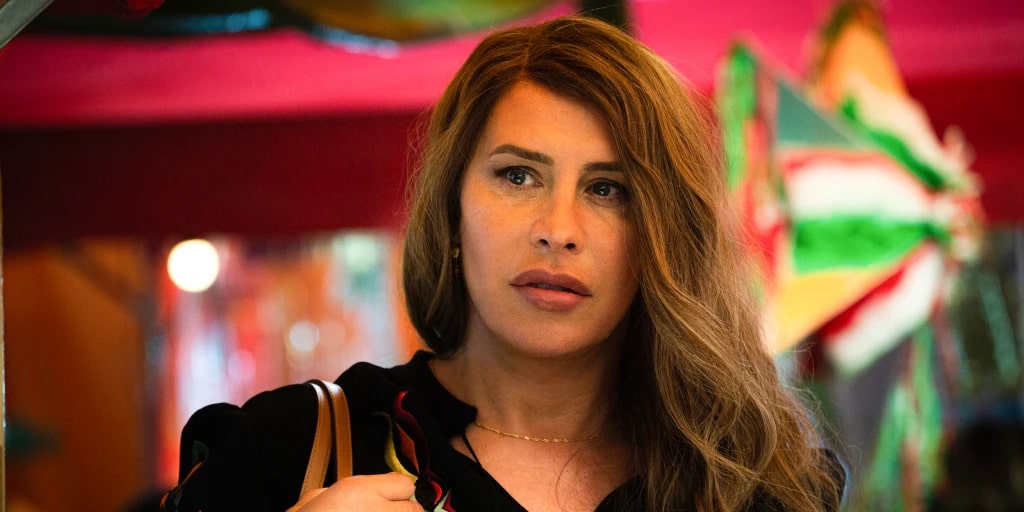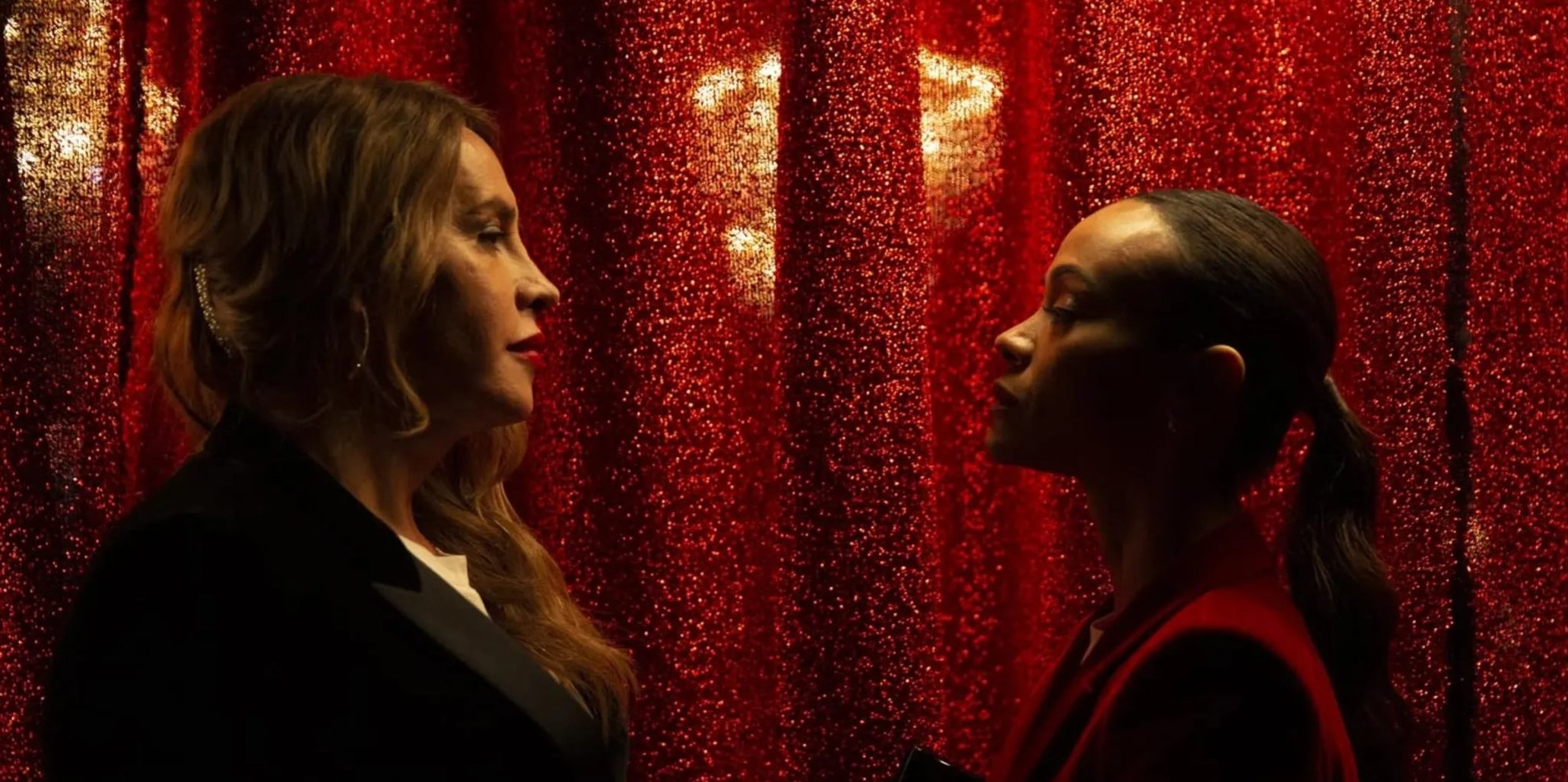Some stories possess such a distinct, intricate charm that they resist fitting neatly into any genre. This is the case with Jacques Audiard’s musical crime drama, ‘Emilia Perez,’ which defies categorization and stands as truly one of a kind. The film centers on Rita Mora Castro, a lawyer who is summoned by a powerful cartel leader seeking her assistance with a gender-affirming surgical procedure. The cartel boss, who adopts the name Emilia Pérez, also has a family—a wife named Jessi and children—whom she wishes to secure a new life in Switzerland.
What unfolds in the Spanish-language film is both profound and understated, pulling audiences deep into an emotional landscape that lingers long after. It captures Emilia’s longing to reconnect with her children and the lengths to which Rita goes to help—persuading Jessi that Emilia, now introduced as her husband’s cousin, wants to support the family. Emilia stands at a life-altering crossroads; once a ruthless cartel leader, she now seeks solace in family and domestic life. This transformation extends beyond the external; her entire identity shifts as she embraces a different version of herself. It immerses viewers in a fantastical journey, yet its themes resonate with real-world complexities, confronting powerful issues like identity, family, and redemption.
Emilia Perez Was First Conceptualized as an Opera Libretto
Although ‘Emilia Perez’ is fictional, the story of its conception is intriguing. During the COVID-19 lockdowns, Jacques Audiard found inspiration while reading Boris Razon’s 2018 novel Écoute. A particular part of the novel stood out to him: the idea of a cartel leader opting for gender-affirming surgery. This concept fascinated the filmmaker, and he initially envisioned it as an opera libretto, intending to express it through a musical, theatrical lens. Over time, however, the idea evolved, and he collaborated with writers Thomas Bidegain and Nicolas Livecchi to transform it into a screenplay.

One of the primary challenges for the creators was finding the right actor to embody the complex role of Emilia. After an extensive search, Jacques Audiard discovered Karla Sofía Gascón, whose background seemed tailor-made for the character. Known for her work in telenovelas, Gascón transitioned in 2018, with her wife and daughter providing steadfast support throughout her journey. Her own life experiences brought a profound authenticity to Emilia, transforming the role from a conceptual idea into a deeply resonant and believable character.
Karla Sofía Gascón’s Inclusion in the Movie Brings a Lot of Nuance to it
In multiple interviews, Karla Sofía Gascón has shared how her relationship with Jacques Audiard grew into something uniquely profound despite their language barrier. She opened up to him about her personal experiences and challenges—physical, mentally, and emotional—throughout her journey. The director paid close attention to her stories, allowing them to influence the direction of Emilia’s character. Gascón’s insights were so impactful that one particular scene, originally scripted to show Emilia in a violent rage, was reimagined. Instead of explosive anger, Audiard adapted the scene to capture a quieter, seething rage born from deep personal pain rather than sheer fury.

One of Gascón’s most impactful contributions to the portrayal of Emilia was her strong belief that the same actor should play Emilia both before and after her transition. This decision added depth to the film’s authenticity, aligning with Gascón’s own experiences and understanding of gender identity. Taking on this dual representation was a challenging endeavor for Gascón, as it required her to embody two vastly different versions of Emilia—physically, emotionally, and psychologically. She meticulously adjusted her voice, explored a broad emotional range, and captured a complex character arc that mirrored Emilia’s personal transformation.
Talking about her role, she said, “All humans have darkness and light, and the movie is about that transition from one to the other. Through this film I realized that men have more freedom physically but are more constrained mentally. And women have more physical limitations but are much more mentally free.” She said that she was able to bring so much to the role because of the hardships and turmoil she had experienced. She felt that if the role had come to her 20 years ago, she would not have been able to do the justice she could have done at 52 years of age.
Emilia Perez Takes a Stand For Marginalized Communities in its Own Way
The film pushes boundaries in representing marginalized communities and authentically exploring their stories, paving the way for more nuanced and truthful portrayals on screen. The film’s impact sparked significant public conversation, particularly after its screening at Cannes in 2024. A French politician’s post on X (formerly Twitter) included a controversial comment that loosely translated to: “So a man has won the prize for best actress.” Gascón responded by filing a lawsuit, claiming “sexist insult due to one’s gender identity.” Her legal action underscores a stand for her own identity and for the broader transgender community, highlighting ongoing challenges and prejudices that marginalized groups face—even in settings intended to celebrate artistic expression.

The film’s fairytale fantasy-like setting might initially seem an unlikely place to confront harsh realities, but the creators have skillfully woven in authentic, raw themes with a thoughtful touch. This “genre-bending” approach bridges a whimsical backdrop with deeply human experiences, allowing the narrative to oscillate between magical realism and gritty truths about gender, identity, and personal transformation. By using a fantastical style, the film invites audiences to reflect on complex social issues within a visually captivating, dreamlike world, making the underlying messages all the more impactful.
Read More: Where Was Emilia Perez Filmed?


You must be logged in to post a comment.